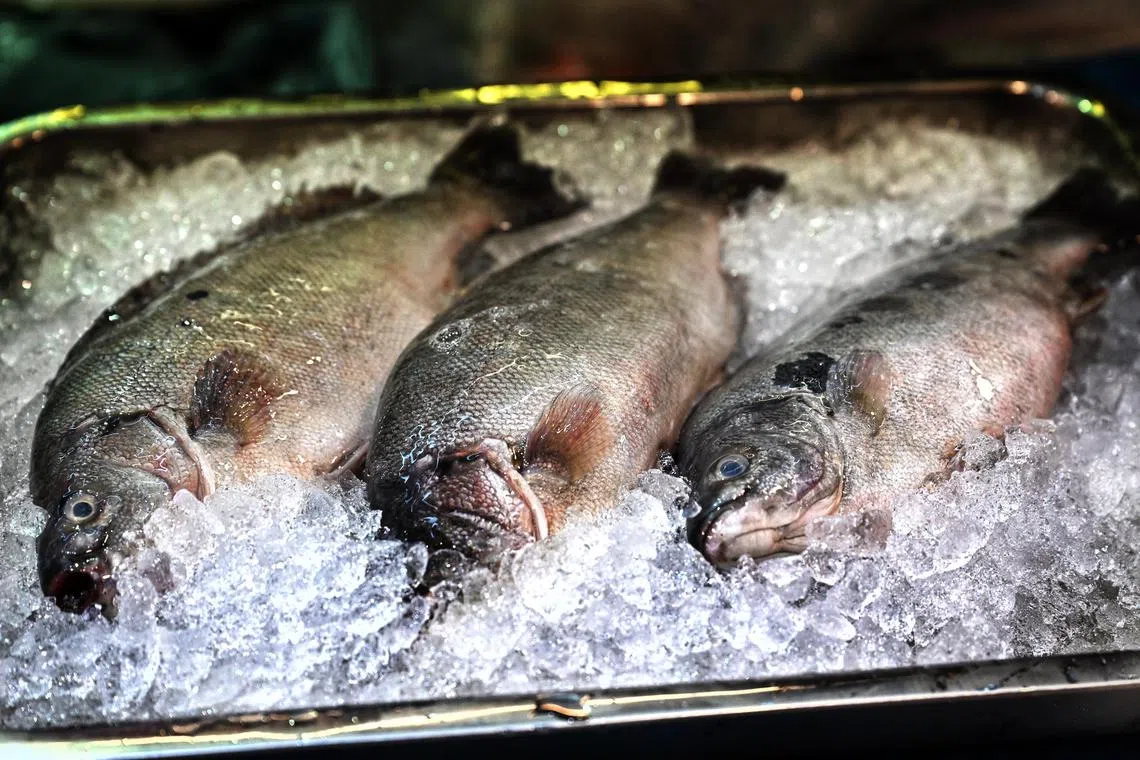First batch of freshwater fish harvested from Tampines container farm
Sign up now: Get ST's newsletters delivered to your inbox

Jade perch reared at the container fish farm is on sale at the Tampines Round Market located a five-minute walk away.
ST PHOTO: CHONG JUN LIANG
SINGAPORE – There is a new offering at fish stalls in a market in Tampines that is harvested in the vicinity and is rich in Omega-3 fatty acids, but costs less than salmon.
The freshwater fish called jade perch is reared in a 20-foot shipping container located a five-minute walk from Tampines Round Market and Food Centre in Tampines Street 11.
The first batch of fish harvested from the community project is on sale at fish stalls in the market, including Ah Kiat Fresh Fish stall.
Mr Benny Hong, who works at the stall, said: “The quality is pretty good. And we have confidence, as it’s produced in Singapore. So we have to get more people to try the fish.”
Mr Hong is selling the fish at $12 for a piece that weighs around 300g to 400g.
He said sales have been “pretty slow” since he started selling jade perch two weeks ago, as Singaporeans are not familiar with the fish.
On June 15, Tampines GRC MPs Baey Yam Keng and Desmond Choo visited the container farm and viewed the harvesting of the fish.
Launched in November 2023, it is Singapore’s first container fish farm located in an HDB estate.
The project is a partnership between Aqualita Ecotechnology and Tampines Town Council, and is supported by Temasek Foundation.
Mr Choo, who is chairman of Tampines Town Council, said the container fish farm is one of the town council’s initiatives to turn Tampines into an eco-town, where residents have easy access to facilities that support a sustainable lifestyle.
It is also Tampines’ contribution to Singapore’s “30 by 30” goal of producing 30 per cent of its nutritional needs locally by 2030.
Mr Choo said having the farm right on the market’s doorstep reduces the middleman and logistics costs, which will translate into lower prices for customers.
Aqualita sales engineer Bryan Lee said the fish is sold to fishmongers at Tampines Round Market at cost price for now, with the hope that they will sell it at a lower price.
Mr Lee did not reveal the cost price, though he said other suppliers are selling jade perch for about $37 per kg.
Compared with other types of fish, jade perch is mid-priced. It is not as expensive as salmon but costs more than batang fish, he said.
Acknowledging that Singaporeans are not familiar with jade perch, Mr Lee said his firm wants to introduce Singaporeans to this Australian breed.
He said the fish is high in Omega-3 fatty acids, which are said to improve heart health. It is also a resilient breed that is easier to rear.
One benefit of the container fish farm is that it can rear up to 560kg of jade perch per harvest, without occupying much space in land-scarce Singapore, Mr Lee said.
The fish takes about six months to grow, so the farm can harvest twice a year.
Madam Sabariah Bupeh, a 71-year-old Tampines resident, tried the fish at a tasting session on June 15.
“I will buy it because it’s very nice and very fresh,” she said.
During his visit, Mr Baey, who is Senior Parliamentary Secretary for Sustainability and the Environment, addressed the media’s questions about a series of local farm closures and their impact on Singapore meeting the 30 by 30 goal.
For example, in May alone, The Straits Times reported that a large local indoor vegetable farm, I.F.F.I, shut its Tuas facilities, and that The Barramundi Group, which farms Asian sea bass, planned to exit its facilities in Singapore’s southern waters.

(From left) Fishmonger Susan Tang, 60 receiving a tray of jade perch fish from Tampines MPs Baey Yam Keng and Desmond Choo.
ST PHOTO: CHONG JUN LIANG
The Barramundi Group said farming in the southern waters comes with higher-than-usual operating costs due to inadequate infrastructure, making it challenging to be cost-competitive and to achieve long-term profitability.
Mr Baey described the 30 by 30 goal as a “very ambitious target”, noting that currently, more than 90 per cent of Singapore’s food is imported.
He said the Ministry of Sustainability and the Environment recognises the challenges that the agriculture sector faces, especially with the Covid-19 pandemic, the rise in the costs of labour and utilities, and the impact of inflation.
For the 30 by 30 goal to be successful, farms must meet the market’s needs and survive market forces, said Mr Baey, who urged Singaporeans and local businesses to support local farmers.
He said: “As the Government, we are committed to this mission and will work closely with stakeholders to ensure we are able to increase the capacity and upgrade the capabilities of our local food sector.”



